It’s the final issue of the truly awesome Black Bolt by the Hugo Award nominated team of Saladin Ahmed and Christian Ward. Recap, review and series review follows.
By way of the sinister trickery of his brother Maximus, Black Bolt had been imprisoned in a terrifying space gulag on the other side of the galaxy. There the one time king of all of Inhumanity was merely yet another prisoner where he and his fellow inmates were tutored mercilessly by the ghoulish Jailer.
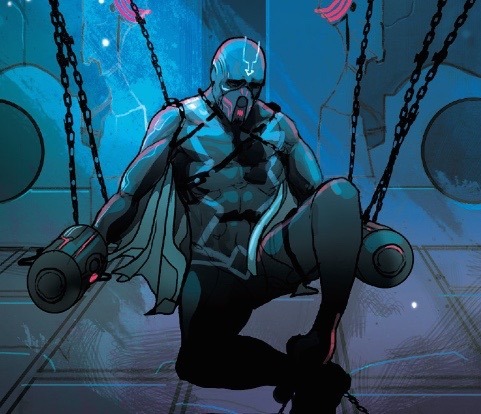
This Jailer was an ancient Inhuman and one-time prisoner who had taken over the space prison and assumed the role of its warden. This Jailer was a vampire of sorts who fed off of the psychic suffering of others; the torture he subjected his inmates to offered up a variable feast to sate his endless hunger.

Black Bolt suffered terribly whist a prisoner in this space jail. It took away his awesome powers and humbled the once proud king. He came to make allies of the various rogues and aliens who were imprisoned alongside him… the sort of beings the Inhuman king had once seen as beneath him.
Black Bolt had always been a solitary man, partly a product of his incredibly destructive voice and the need to remain always silent less he were to unleash havoc.
He had his family, his wife and son, and cousins he loved dearly, as well as his subjects among old Attilan that he dedicated his life to. Yet he never allowed himself to depend on them, seeing such dependency a sense of weakness not afforded a king. Ultimately his stoicism, his need for self reliance and the difficult decisions he had to make as leader cost him everything. His wife left him, his son resented him, Old Attilan was destroyed. And having lost everything offered Black Bolt a new perspective, a vantage that allowed him to see the key differences between power and strength; and in so doing provide him with the opportunity of redemption.
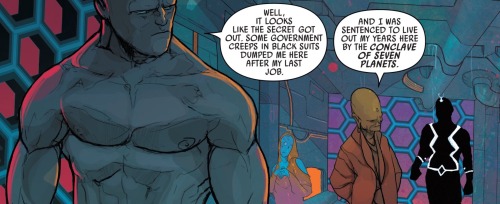
Power is solitary. A king sits alone and Black Bolt’s withholding solitude enabled him to keep this power, like a building energy that he could release with a devastating whisper. Strength, however, is mutual… it comes from the bonds of relationships, dependency and relying on others.
This was the sort of strength Black Bolt found in the forging of bonds with his fellow inmates. Together with the assistance of his trusted teleporting dog, Lockjaw, Black Bolt and his friends were able to defeat the Jailer, destroy the prison and escape their incarceration.
The victory came at a cost. Crusher Creel, the earthly super villain known as The Absorbing Man had sacrificed himself so to enable Black Bolt to strike the killing blow that destroyed the Jailer. And in delivering this blow, Black Bolt lost a sizable portion of his powers.
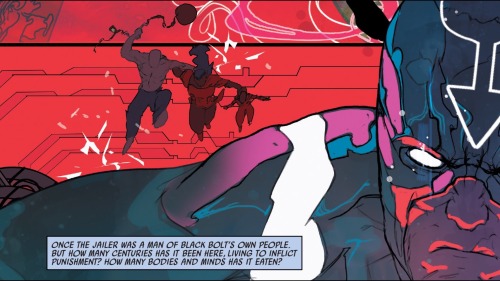
In the aftermath, the prisoners went their separate ways, leaving Black Bolt to care for the youngest of the lot, a little alien girl with physic powers. Her name is unpronounceable by earthly language, so she just goes by ‘Blinky’ …a suitable nickname for a youngster with so very many eyes.
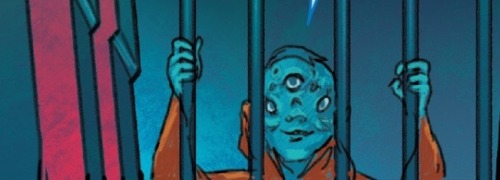
Black Bolt was reluctant to take Blinky under his wing, care for another child after failing so terribly with his own son, Ahura. Yet their was no choice in the matter. Blinky had nowhere else to go and Black Bolt was not going to abandon her… so he brought her with him as he traveled back home to earth.
His homecoming was not as he had hoped. Medusa, his former wife, was gone having ventured out on a dangerous mission tot he stars in hope of discovering a new source of Terrigen. And his son, Ahura, was embittered to see that his dad had taken on a new ward in Blinky; he felt replaced.
Before Black Bolt could tend to these matters, however, he was obligated to fulfill a promise to seek out Creel’s wife and inform her of his passing. Creel wife is Titania, a villainous (albeit noble) super powered being in her own right. Titania was devastated to learn of her husband’s fate yet took solace in the heroic and selfless fashion of how he died.
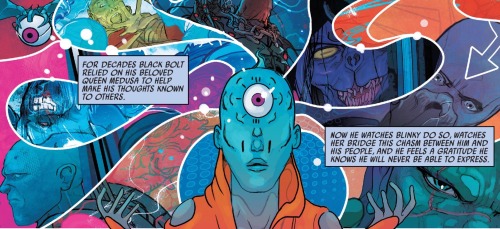
Following her husband’s funeral, Titania was there to witness as the evil Inhuman known as Lash attacked Back Bolt. His powers halved, Black Bolt was bested by Lash and he abducted Blinky.
Lash had concocted a poorly devised scheme to utilize the purified Terrigen in Black Bolt’s blood to create a new Terrigen Cloud and hence produce a new army of Inhuman soldiers with which Lash planned to subjugate the world. Playing into his trap, Black Bolt and Titania rushed to Lash’s layer in Greenland, desperate to save Blinky from his clutches.
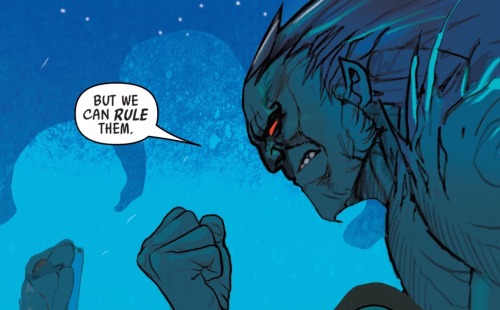
Lash and his forces outmatched Black Bolt and Titania. Black Bolt was poisoned and installed into some bizarre machine meant to atomize his blood into a new Terrigen Cloud. All of it was too much for Blinky. The trauma of it caused her to be overwhelmed by her own psychic powers. It turned out that a small portion of The Jailer’s sentience had survived by hiding away within the recesses of Blinky’s mind. And the psychic trauma enable this sliver of The Jailer to take over, utilizing Blinky’s power to create tangible illusions to transform her into a reconstituted version of himself.
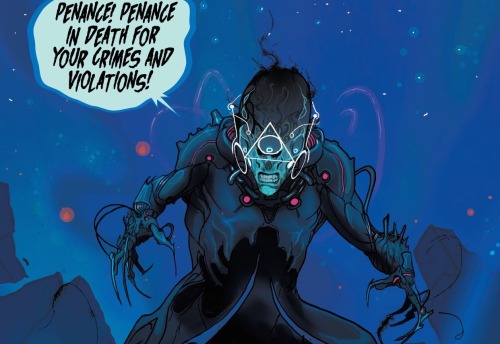
Reborn and re-powered, The Jailer cut through Lash’s forces and killed the would be despot. Unwilling to see Titania perish as her husband had, Black Bolt forced her to flee and chose to face The Jailer on his own, hoping against hope that he might prevail and save Blinky.
A foolish move. Black Bolt was no match for The Jailer, especially with his powers at half strength. Yet somehow, via his unconscious, Black Bolt was able to once more utilize the lesson that enabled him to defeat the Jailer the first time. It wasn’t something he could do alone; he needed help.
His mind called out to Blinky and hers called out to Ahura. Ahura is a powerful psychic in his own right and somehow his astral self was pulled in alongside Blinky to the mind-scape of Black Bolt’s tortured ego.

Blinky and Ahura wander through the folding architecture of Black Bolt’s memory. They come across his earliest memories, where he was the subject of his parents cruel experiments.
Black Bolt’s parents, King Agon and his wife, Queen Rynda, were obsessed with unlocking the higher potentials of Terrigenesis… so much so that they exposed their son to the Terrigen gasses in utero. He was born with his awesome powers already en tact and his initial infant cry unleash a wave of destruction. As a result, Black Bolt was forced to spend his childhood in seclusion, within a lonely sound-proof chamber where he’s only company were brief visits by his loyal dog, Lockjaw.

Intent on honing his son’s incredible powers, Agon continued to subject Black Bolt to further training, using harsh means to bestow a sense of absolute self control and self reliance. He induces terrible nightmares into his sleeping son’s mind, insisting that Black Bolt endure these terrors quietly and with abject stoicism.
Seeing this is shocking to Ahura. He knew his grandfather was a stern man, but he never imagined his father’s up bring was so painful and lonely. Still, all this is just a memory, something that occurred in the past. But Blinky reminds him that memories of pain are never truly in the past, they are dynamic, constantly recurring in the present. And hence Ahura opts to act, yelling at his bastard grandfather to leave his dad alone.
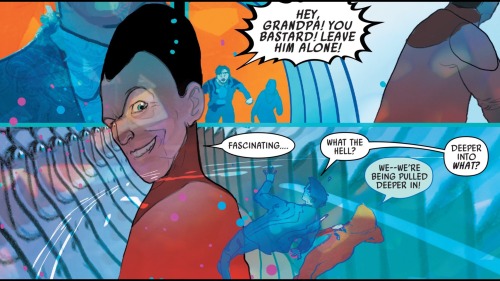
The visage of Agon hears his grandson, a sinister smile etched across his face. He becomes an amalgam of Agon mixed with he Jailer, lashing back against the invasion that Blinky and Ahura represent.
The shockwave sends the two further into the contours of Black Bolt’s psyche. They find themselves facing off against the nightmare beasts projected into the toddler aged Black Bolt’s mind.
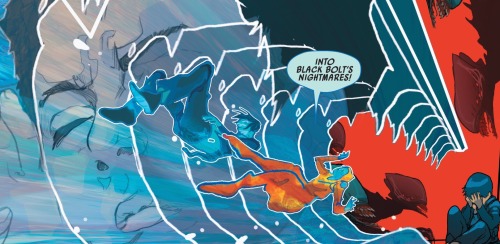
Yet Blinky and Ahura are not defenseless and are able to use their own powers to vanquish the nightmare monsters. In its wake, Ahura received the very odd opportunity to meet the child version of his own father.
Elsewhere, Lockjaw has used his teleporting powers to transport Titania to the graveyard where her husband was buried. There was no body to burry so they had to make do with burying his weapon of choice, an iron ball and chain that he wielded like a mace.
At first Titania is angered and perplexed that lockjaw had brought her here. She wanted to go gather up Creel’s former allies among the Wrecking Crew to return and take on The Jailer. Still, Lockjaw possesses an extra-perceptual sense. He has brought Titania here for a reason and that reason soon becomes evident. The ground of Creel’s grave begins to stir and a metallic hand reaches out from he disturbed soil. Creel himself emerges from the ground, resurrected. It turns out that a portion of his sense of self remained within the molecules of his weapon. Just as The Jailer had hitched a ride in the back of Blinky’s mind so too had Creel stowed away within his weapon. And finally he had managed the will to reconstitute himself. These hows and whys do not matter to Titania, she is overjoyed to have her love back in her arms.
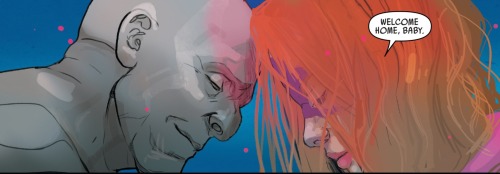
Their tearful reunion is sidetracked when Titania informs Creel that The Jailer is still alive, that he has Blinky and Black Bolt now fights him alone. Creel knows that they must go to fight the Jailer, but must admit that he is terrified by the prospect of it. It’s perhaps the first time that Titania has seen her husband openly express true fear. Yet it’s a fear that he won’t let stop him. Bravery is not fearlessness, it is action despite the fear.
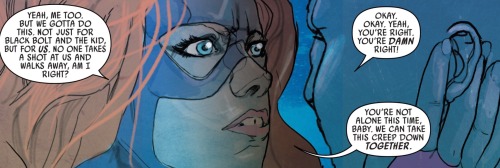
Lockjaw teleports the trio to Greenland and they leap into the fray, taking on the Jailer alongside Black Bolt.
As the battle rages on the outside of Black Bolt’s mind, so too does it within his mind as his child self, Blinky and Ahura fight against the terrible imago of the Jailer mixed with Agon.
Blinky and Ahura fight valiantly but ultimately are no match for the terrors of a lifetime of sorrow, pain and trauma. The child aged Black Bolt holds back, still fearful of losing control of his own rage. Seeing his new friends in such peril unlocks him, he sheds the sense of restraint and withholding that his father’s training had instilled in him… unleashing the terrible power of his voice as he demands that this monster leave his friends alone!

And this power obliterates the sinister imago.
It’s a catharsis, a psychic breakthrough that offers the adult Black Bolt sense of clarity and understanding. His powers have not been halved due to the strain of his earlier battle, rather it has been a psychosomatic condition that he had bestowed onto himself.

Power and strength. Black Bolt gained power through his solitude and strength through relations. He so wanted to maintain that new strength, these new relationships that he repressed his power… erroneously believing that one cannot exist with the other. But he is able to see things more clearly now. It is not a matter of autonomy or mutuality, but rather autonomy and mutuality… power and strength.
Black Bolt full powers have returned. The Jailer makes a last gambit to prevent Black Bolt from unleashing this power, muzzling his mouth with a red energy that seems to represent purified fear.
Black Bolt is afraid. He’s afraid in a way he would have never admitted to before. Yet he sees his new allies, Creel and Titania fighting alongside him, coupled with sensing the presence of his son and daughter fighting within him, imbues him with the power and strength to break through this fear.
He rips off this red fear and speaks a single phrase to the Jailer: ‘It’s over.’

The energy unleashed by these words disintegrates the Jailer, ripping away all of the fear and pain and suffering that empowered him. What is left behind is a weak and lonely man, an ancient Inhuman being who was cast away and imprisoned eons ago. Stripped of the fear that sustained him, this sad being also dissipates, fading off into the past like a memory that is fully digested.
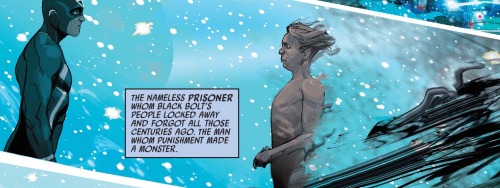
The Jailer gone, Blinky regains her body. Somehow, Ahura’s physical self has been transported to the scene as well. Black Bolt does not understand how it is his son has come here, nor how his friend, Creel, has been resurrected. And once again, the hows and whys do not matter… he is simply overjoyed to see them.
Ahura tentatively approaches his dad. He understands his father better than he had before, but still isn’t sure how to really connect with him. Black Bolt relives Ahura of this uncertainty, taking his son in his arms and embracing him. The kind of hug, of nurturing poor Ahura had long since been denied. It cannot make up for the pains of his childhood, but it is a start toward a new path forward.
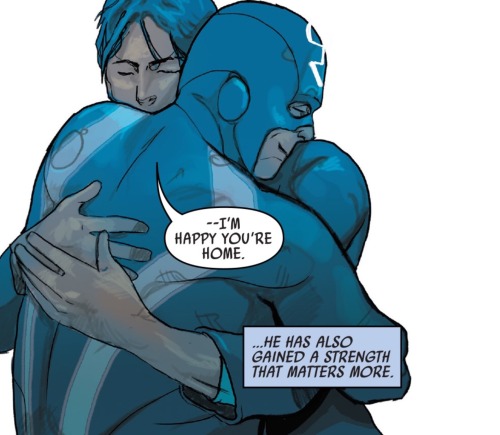
The narrative jumps a week forward. Creel, Titania, Blinky and Lockjaw sit about Creel and Titania’s apartment, playing video games and eating ice cream. Black Bolt is in the kitchen, taking his twelfth attempt at frying an egg.
Black Bolt has learned a great deal through this whole ordeal, he has grown tremendously. But he still has much to learn. He is still rather new and awkward with the concept of friendship, offering to buy Creel his apartment building as payment for his aide. He still struggles with the idea that interpersonal relations are not a matter of commerce, trading goods for service. And he continues to be a really lousy chef, once more burning the egg he attempted to cook.
And just as Black Bolt has learned and grown, so too has Blinky. She has been imbued with a new confidence and bravery. She speaks of returning to her home world and leading a rebellion among the downtrodden of her peoples.
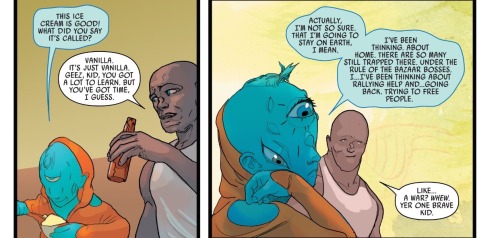
Creel comes into the kitchen and has to laugh at Black Bolt’s continuous failed attempts to fry an egg. The one time Inhuman king has the power to levels mountains, yet the simple act of cooking an egg seems beyond him. Not that Black Bolt minds. He’s shed his pride and hubris; he can laugh at himself and accept his own shortcomings.
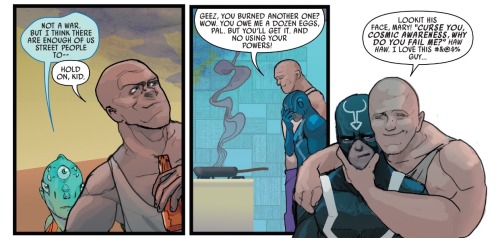
A loud thud echoes from atop the building. Something has landed there and Black Bolt can sense what it is that has arrived. He flies up to the roof where he finds his former wife waiting for him.
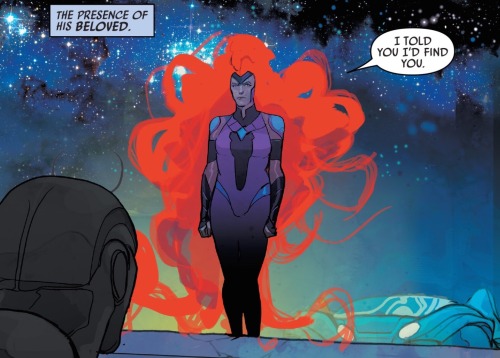
Medusa has endured her own trials. She and her team of Royals had ventured to the World Farm were the stole from the godlike beings known as The Progenitors the raw Primagen, from which a new source of Terrigen can be derived.
The theft garnered The Progenitors’ attention and they had traveled to earth to destroy it and process it for resources.
These Progenitors are beings of our logic and Maximus had devised a means to defeat them by way of the total lack of logic existent in emotion. Medusa was sent to an astral plain to battle these being on her own. In this task, Medusa summoned Black Bolt’s mind. Just as Black Bolt was fastened to Lash’s machine, struggling to resist it, so too was Medusa on the astral plain fighting against The Progenitors. Somehow, the two were able to link minds and draw strength from one another. And the strength derived from their mutuality enabled Medusa to repel the Progenitors… as it ultimately also allowed Black Bolt to resist Lash’s machine as well as destroy The Jailer.
Now the two are reunited in the physical as they had been on the astral. His powers fully restored, Black Bolt can no longer speak. Yet he doesn’t have to. Black Bolt and Medusa had once been so close with one another that words were not necessary. Medusa was able to infer her husbands thoughts and feelings simply by way of their intimate interconnectivity.
They had drifted apart as their divergent obligations create a schism between them. They lost that connectivity and the lack of communication drove them further apart until it reach the point of no repair.
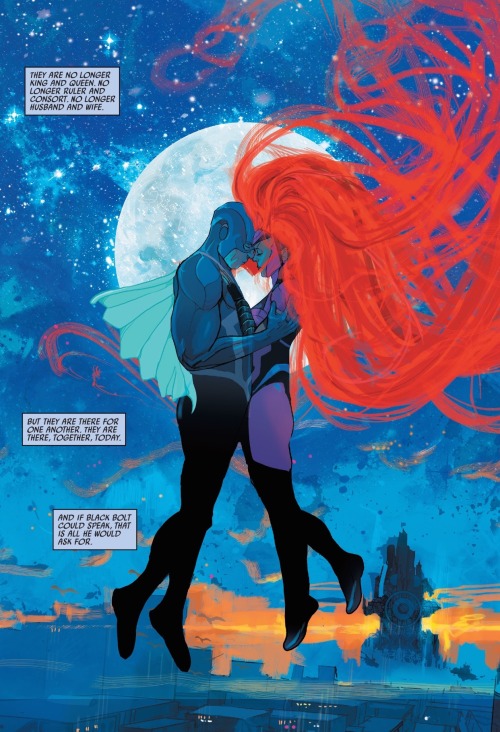
Black Bolt takes Medusa in his arms and the two float above the New York skyline. The two no longer king and queen, no longer husband and wife. They have lost much but through it all regained that connectivity. They are together once more and can know one another without words.
And here the issue and the series itself comes to a conclusion.
We know from their brief cameo in the first issue of Lockjaw’s own solo series that Black Bolt and Medusa are once more a couple. As for what the future holds for the pair, for the Inhumans as a whole… that will have to wait to be revealed this summer when Donny Cates and Ariel Olivetti will bring us the ominously entitled ‘Death of The Inhumans.’ It’s a frightening prospect, but for the time being we get a happy ending.
Endings are tough; final issues even tougher. There is a pressure to wrap things up just right so not to adulterate all that had come before. In hindsight, I should never have worried about Ahmed and ward’s ability to stick the landing… of course they would. This series has been an absolute marvel to behold and the last issue is no different, offering up a final battle that both summarizes and cements the overarching thematic of Black Bolt’s journey.
In as such the narration at times leans a bit heavily on exposition, spelling out matters that are already evident to those who have been following the series from the start. And yet I don’t mind it because it reenforces and affirms the central premise. There’s no longer a need for guesswork and subtly. This is the end so it makes sense that the narration should be so up front with exactly what is going on.
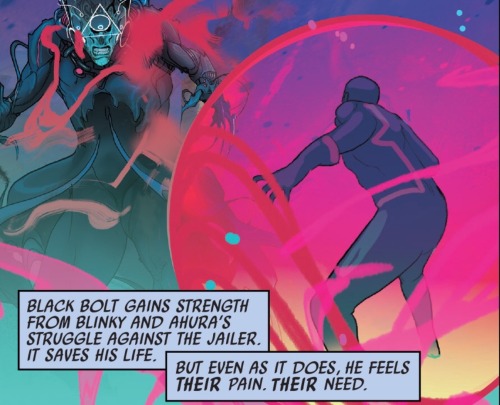
Power and strength, autonomy and mutuality. This is the dichotomy at the heart of this series as a whole. Black Bolt has always been powerful, but has not been especially strong. As king, Black Bolt needed to be powerful to care for and defend his people. To this end he consolidated his power by closing himself off, withdrawing into himself more and more – amplifying the power by augmenting his solitary, autonomy and self reliance. He did so because he felt he had too and accepted the tole that it extracted. Harkening back to the Infinity and Secret Wars events, Black Bolt’s actions helped to save his people and the world as a whole. Yet it cost him everything. He lost his throne, his wife and his family. He became too autonomous and such autonomy is tantamount to abject solitude.
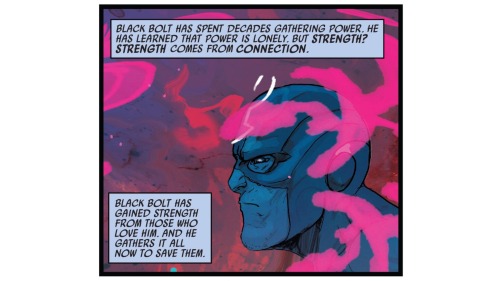
Cast off to the space prison, Black Bolt had his powers stripped away. Without his power, he was forced to cultivate strength. Autonomy was no longer an option and he had to cultivate the foreign notion of mutuality. He had to make friends, rely on others, interconnect. He needed to allow himself to be maternal toward the alien child Blinky as well as true collegiality with the human rogue, Creel.
Fumbling his way to achieve these things offered Black Bolt strength. Yet strength is quite different compared to power. Power has certainty and fearlessness, whereas strength entails accepting uncertainty and allowing oneself to admit to fear.
It so uncommon to see superheroes truly afraid. It makes it easy to mistake fear with cowards and weakness. Yet fear is not weakness, it is an acknowledgment that things are important, that there are matters one is fearful of losing. The truth is a person cannot be strong without being afraid. Being strong means admitting that others are important to you and such an acknowledgment cannot exist without the fear of loss.
Black Bolt had to face that fear when he originally escaped the space prison. Lockjaw had engineered his escape and Black Bolt could have easily fled, leaving his new friends behind. He feared for his life and freedom, but mores feared for the wellbeing of others. And through that fear he was able to muster the bravery to return and help save his friends and vanquish the Jailer.
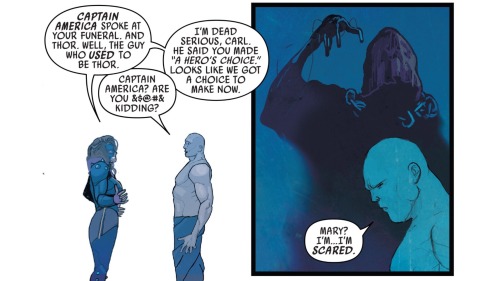
We see this same thematic reiterated with the fear Creel expresses when he learned the Jailer was still alive. He had just resurrected himself and reunited with his wife. The prospect of facing The jailer once more filled him with dread and again it was quite surprising and unusual to see a super powered comic character so openly express such fear. But again, such fear is part and parcel with the strength and mutuality and, with Titania at his side, Creel was able to transform the fear into bravery and jump back into the fray, offering up the crucial support that tipped the scales and allowed the good guys to prevail.
All of these matters were facilitated by way of the story’s willingness to make the supporting characters fully dimensional and present. It’s an odd irony that this series should be considered a Black Bolt solo series in that the word ‘solo’ is so antithetical to the plot and heart of the story. The relationships that Black Bolt forged with Blinky and Creel was paramount to the story and that’s why it was so important that these characters be given such intricate attention and development. Which also offers up a nice bonus for me as a reader in that I now love the character of The Absorbing man as much as I love Black Bolt.
Speaking of mutuality, another matter that has made this series work so well is the keen interplay between the writing and art. Ahmed and Ward worked hand in glove, creating a synergy where they produced a product greater than the sum of its parts.
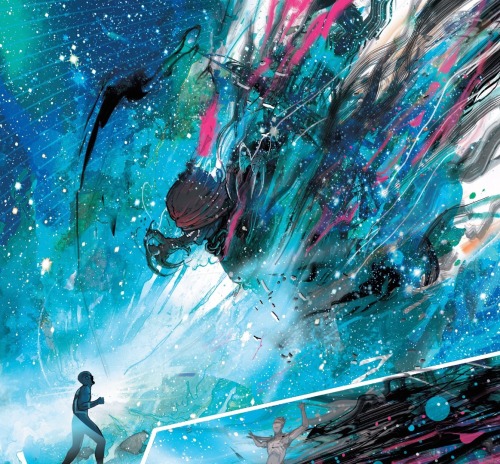
The heavy introspection of Ahmed’s scripts were augmented and realized by the dynamic line-work and psychedelic layouts that Ward’s art provided. The words never overpowered the visuals nor did the visuals overpower the words. Instead they worked in cohesion… creating yet another example of the strength endowed by mutuality.
This book is a triumph. It’s crushing that it has come to an end. I could read a hundred more issues and still want more. Still, there are some benefits to brevity of the series. Twelve issues and all of them pretty much perfect. The series ended before it could sway off course, before a lackluster filler issue could be introduced to sour the mix. Black Bolt is done and in its conclusion is frozen in amber and cannot be taken away. Maybe Marvel will forget about The Inhumans, maybe Cates and Olivetti will kill them off in gristly brutality. Who knows what the future holds… whatever it is it will be unable to take away what Ahmed, Ward, Cowels and Moss has achieved.
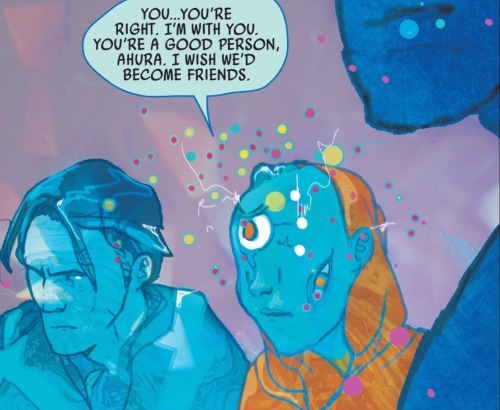
It’s not easy being a super fan of The Inhumans. First they were obscure fringe characters that few of my friends were even aware of, then they became hated usurpers unfairly charged with trying to replace the X-Men. And then there was the utter embarrassment of that awful television show (great performances by the cast, but a rushed, hasty effort that made my beloved heroes seem a laughing stock). And now the future casts an ominous shadow with the prospect of their death. So, yeah, being an Inhuman super fan isn’t easy… Yet the fact that The Inhumans were involved in such a flawlessly executed comic as Ahmed and Ward’s Black Bolt, that an Inhumans book could actually be nominated for a Hugo Award. It’s a dream come true. And Mr. Ahmed and Mr. Ward will always have my great gratitude for it.

This is comics at its best. Five out of five Lockjaws for the issue…

a million Lockjaws for the series as a whole.




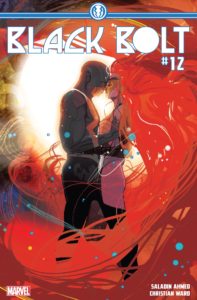
 Mosaic #6 Review (spoilers)
Mosaic #6 Review (spoilers)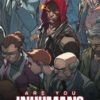 Inhumans Recap: 2014 to Now
Inhumans Recap: 2014 to Now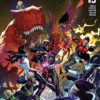 Inhumans Versus X-Men #3 Review (spoilers)
Inhumans Versus X-Men #3 Review (spoilers)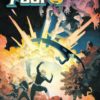 Fantastic Four #2 Review (spoilers)
Fantastic Four #2 Review (spoilers)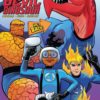 Moon Girl & Devil Dinosaur #30 Review (spoilers)
Moon Girl & Devil Dinosaur #30 Review (spoilers)